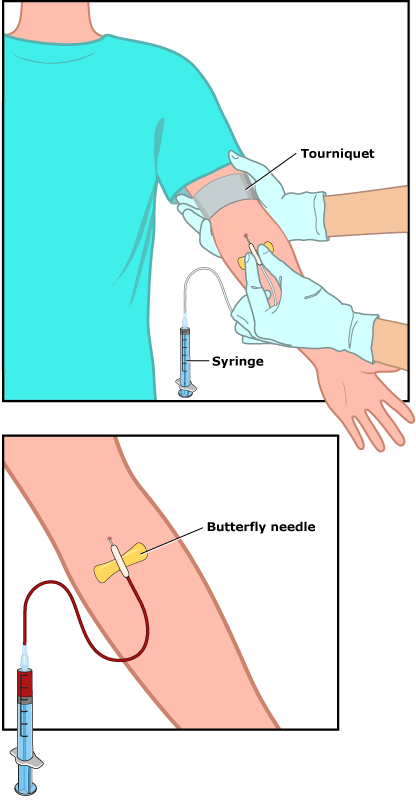Getting a Blood Test
What Is a Blood Test?
By taking and testing a small sample of a person’s blood, doctors can check for many kinds of diseases and conditions. Blood tests help doctors check how the body’s organs are working and see if medical treatments are helpful.
How Do I Prepare for a Blood Test?
To get ready for a blood test, find out if you need to fast (not eat or drink) or should stop taking medicines before the test. Tell your doctor about any medicines you take because some might affect the test results.
It can help to wear a T shirt or other short-sleeve top on the day of the test to make things faster and easier for the technician who will be drawing the blood.
How Are Blood Tests Done?
Collecting the blood for the test takes only a few minutes. A health care technician will:
- Clean the skin area (usually the inside of an elbow or back of a hand) with antiseptic.
- Put an elastic band (tourniquet) around the upper arm to apply pressure. This makes the veins swell with blood.
- Insert a needle into a vein. Occasionally, it can be hard to find a vein, so the technician may need to try more than once.
- Draw the blood from the vein into a vial or syringe.
- Remove the elastic band.
- Remove the needle and cover the area with cotton or a bandage to stop the bleeding.
Sometimes blood tests can be done as a “fingerstick” test. The health professional will clean your finger, then prick the tip of it with a tiny needle (or lancet) to collect the blood.

Can a Parent Stay With Me During a Blood Test?
Parents usually can stay with their child during a blood test. Try to relax and stay still because tensing muscles can make it harder to draw blood. You might want to look away when the needle is inserted and the blood is collected. Try taking slow deep breaths or singing a favorite song to help you relax.
Are There Any Risks From Blood Tests?
A blood test is a safe procedure with minimal risks. Some teens might feel faint or lightheaded from the test, and a few have a strong fear of needles. If you're anxious, talk with the doctor before the test about ways to make the procedure easier.
A small bruise or mild soreness around the blood test site is common and can last for a few days. Call your doctor if the discomfort gets worse or lasts longer.
What if I Have Questions?
If you have questions about the blood test or what the test results mean, talk to your doctor.


